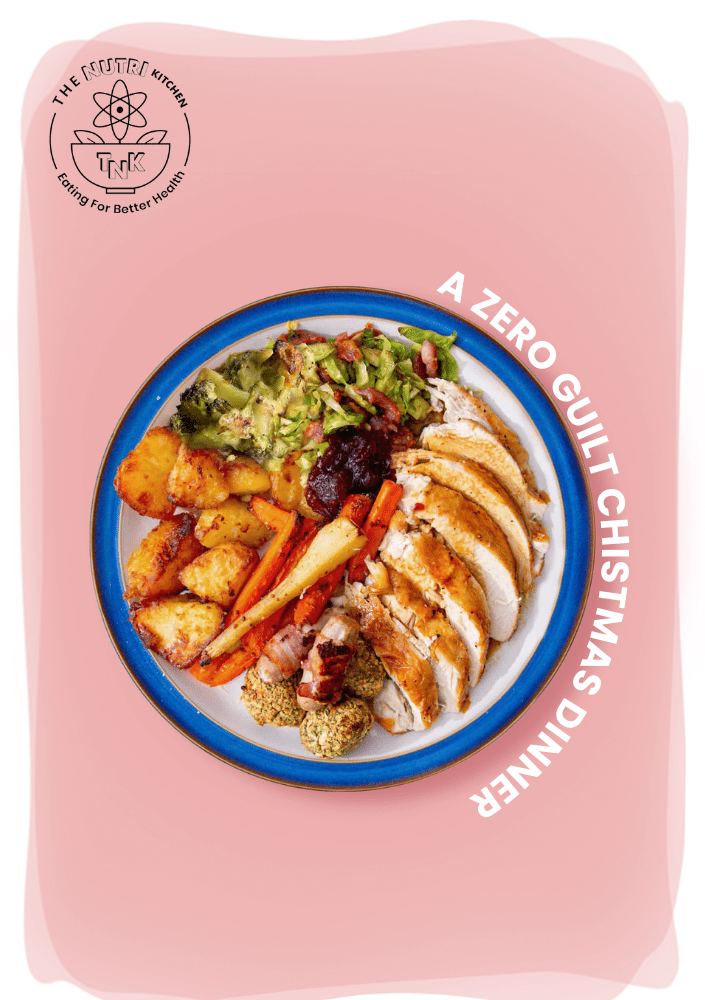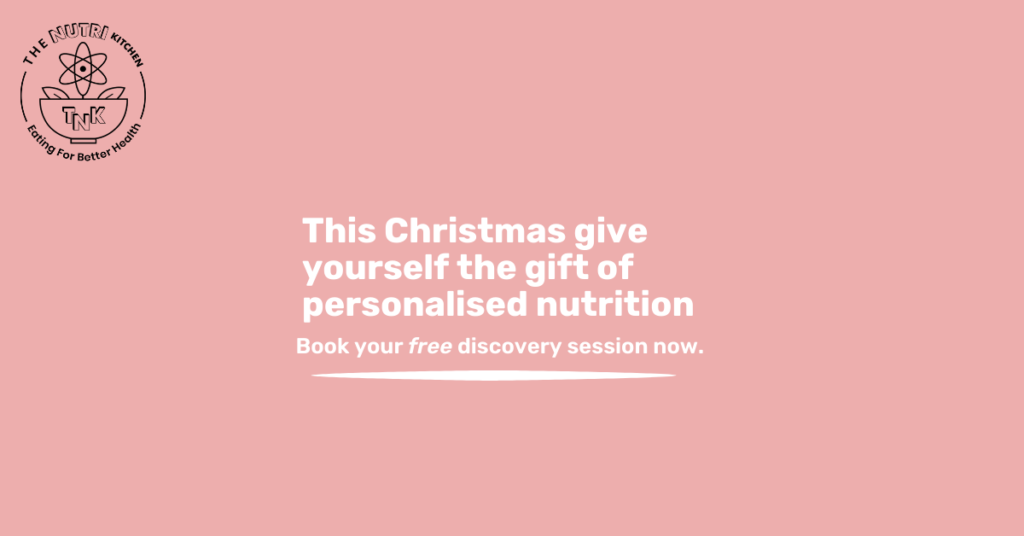How to have a guilt-free Christmas. A no-nonsense guide from a Registered Nutritionist.
The Christmas season is filled with joy, festive cheer, and, of course, delicious food. But with all the temptations around — from Christmas cookies to mulled wine — it’s easy to slip into unhealthy habits. However, staying on track with your health goals doesn’t mean you have to miss out on the holiday fun!
In this guide, we’ll share practical, science-backed tips to help you enjoy a healthy and balanced Christmas. Whether you’re attending a party, hosting a family meal, or simply navigating the festive season, we’ve got your health covered with mindful eating strategies, healthier food swaps, and tips for staying active throughout the season.
1. Practice Mindful Eating to Avoid Overindulgence
Christmas food is undeniably tempting, but you don’t have to overeat to enjoy it. Mindful eating is a powerful strategy that helps you stay aware of your hunger cues and eat more consciously. Research has shown that when we eat mindfully, we’re more likely to make healthier choices and feel satisfied without overindulging [1].
Here’s how to incorporate mindful eating into your Christmas routine:
- Slow Down and Savour the Moment: Take your time to enjoy each bite of food. When you eat slowly and savour the flavours, you’re more likely to recognise when you’re full, reducing the risk of overeating.
- Pause and Reflect: Before reaching for that extra mince pie or a second helping of Christmas pudding, ask yourself: “Am I really hungry or just eating out of habit?” This simple pause can help you make more mindful choices.
- Avoid the “All or Nothing” Trap: The holidays can make it tempting to think, “I’ve already overindulged, so why not keep going?” Instead, remind yourself that one treat won’t ruin your progress — it’s about balance, not perfection [2].
2. A Healthy Christmas Dinner: Enjoy Your Feast without Guilt
Christmas dinner is a big part of the festive experience, but you can enjoy a nutritious meal without sacrificing taste. With a few simple adjustments, you can make Christmas dinner both delicious and healthy.
- Pile on the Veggies: Vegetables are nutrient-packed and make the perfect choice for Christmas dinner. Fill at least half of your plate with vibrant vegetables like Brussels sprouts, carrots, or roasted root veg. They’ll fill you up and provide plenty of fibre to keep your digestion on track [3].
- Choose Lean Proteins: While turkey is a classic Christmas food, opt for lean cuts like turkey breast. If you prefer plant-based options, a hearty nut roast is a great alternative to keep things light but satisfying.
- Mind Your Carbs: Potatoes, stuffing, and other carbs are a staple on Christmas plates. Instead of piling them high, try smaller portions or swap traditional options for healthier alternatives like mashed cauliflower or roasted sweet potatoes [4].
- Lighten Up the Sauces: Many Christmas sauces are rich in cream and butter, but you can easily lighten them by swapping in healthier ingredients like olive oil or low-fat Greek yoghurt.
Have a little look at the plate below- based on our Nutri-plate. It’s a simple yet easy way to eat a fresh and balanced diet because we focus on every meal as opposed to giving you general guidelines. This way you can eat whatever you feel like knowing the meal is nutrient packed and filling. Yes, even your Christmas dinner.

3. Stay Active: Fun Ways to Keep Moving During the Holidays
Between festive meals and family gatherings, staying active during the holidays can be a challenge. However, staying active is key to feeling good both physically and mentally.
Here are some easy and enjoyable ways to get moving this Christmas:
- Go for a Post-Dinner Walk: After enjoying Christmas lunch, take a stroll around the block with family or friends. It’s a great way to aid digestion and enjoy some fresh air after a heavy meal [5].
- Host a Family Dance Party: Put on your favourite Christmas tunes and get everyone dancing. It’s a fun way to burn some energy while spreading festive cheer.
- Sneak in Exercise Snacking: Don’t have time for a full workout? No problem! Try fitting in small bouts of exercise throughout the day, such as doing squats whilst decorating the tree or calf raises while stiring some gravy.
5. Plan Ahead: Take Control of Your Health Goals
The holidays can be chaotic, and it’s easy to let your health goals slip in the hustle and bustle. But with a little bit of planning, you can stay on track without missing out on the festive fun.
- Designate Indulgence Days: Instead of allowing yourself to indulge every day, pick a few events or meals where you can enjoy food freely. This gives you something to look forward to and prevents you from feeling guilty about occasional indulgences [7].
- Eat Balanced Meals Before Big Events: If you’re heading to a festive dinner or party, make sure you have a nutritious breakfast or lunch beforehand. This will help you avoid showing up starving and overindulging when you arrive.
- Stick to Your Shopping List: Meal planning is essential during the holidays. Stick to a shopping list to avoid picking up unhealthy treats while in the supermarket. Planning ahead makes it easier to stay on track and avoid mindless snacking.
The 80/20 Approach.

The 80/20 approach is all about balance and flexibility. It encourages you to focus on nourishing, balanced meals 80% of the time while leaving 20% for treats and spontaneous enjoyment. This way, you can prioritise your health without feeling restricted or missing out on the foods you love. It’s not a diet—it’s a sustainable way of eating that fits into your lifestyle, even during special occasions like Christmas.
Christmas Day is a great time to try the 80/20 rule. Start the day with a balanced breakfast, like scrambled eggs with smoked salmon and wholegrain toast, to set you up for the celebrations. At lunch, fill your plate with turkey, roasted veg, and a serving of stuffing to stick to the 80% of your Nutri meals.
Then comes the fun 20%—a slice of Christmas pudding, a mince pie, even a second round of christmas dinner or a handful of chocolates from the selection box.
The 80/20 rule means you can enjoy these treats guilt-free, knowing most of your meals are still balanced. It’s about enjoying Christmas while keeping things realistic and stress-free—focusing on the people and memories, not just the food.
6. Hydrate, Hydrate, Hydrate: Don’t Forget the Water!
With all the sugary drinks and festive cocktails around, it’s easy to forget about water. But staying hydrated is crucial for feeling your best during the holidays.
- Drink Water Throughout the Day: Make sure to drink plenty of water throughout the day, especially if you’re drinking alcohol. It will help you stay hydrated, support your energy levels, and keep you feeling good.
- Alternate with Water: To prevent overindulgence in sugary drinks, alternate alcoholic beverages with a glass of water. This will help keep you hydrated and reduce your alcohol intake [6].
7. Stay Positive: Celebrate Your Progress
Staying healthy over Christmas isn’t about being perfect — it’s about finding balance and celebrating your achievements. Reflecting on your progress will help you stay motivated and focused on your goals.
- Write a Letter to Your January Self: Take a moment to write a letter to yourself, looking ahead to how you want to feel in January. This is a powerful tool to keep you motivated and focused on your health goals [7].
Be Kind to Yourself: If you slip up, don’t be too hard on yourself. Every small victory counts, whether it’s staying hydrated, moving more, or making healthier food choices. Christmas is about enjoying yourself, so be proud of your efforts!

References
[1] O’Reilly, G., et al. (2014). The effectiveness of mindful eating interventions for overweight and obesity: A systematic review. Journal of Nutrition Education and Behaviour, 46(3), 247-261.
[2] Witthoft, M., & Lillard, A. (2015). The effect of food-related justifications on consumption: Evidence from a Christmas study. Journal of Consumer Research, 42(4), 547-562.
[3] Berg, C., et al. (2019). Vegetables and health: A focus on the role of antioxidants. European Journal of Clinical Nutrition, 73(7), 978-989.
[4] Falk, M., et al. (2015). Effects of portion size and food variety on food intake and enjoyment at meals: A systematic review
. Appetite, 95, 147-157.
[5] Lee, I.M., & Paffenbarger, R.S. (2017). Physical activity and weight control: A review. British Journal of Sports Medicine, 51(7), 515-520.
[6] Micha, R., et al. (2017). Global dietary habits and the risk of cardiovascular disease: A comprehensive review. European Heart Journal, 38(25), 1939-1948.[7] Garber, C., & Schneider, M. (2018). Managing holiday stress: Strategies for mental and physical well-being. Health Psychology, 37(1), 12-23.

